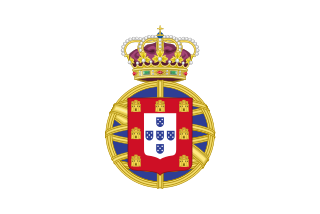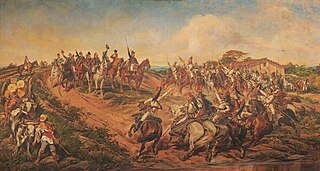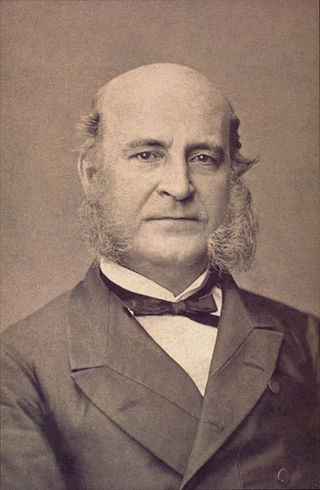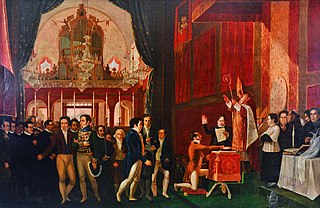
DomPedro I was the founder and first ruler of the Empire of Brazil, where he was known as "the Liberator". As King Dom Pedro IV, he reigned briefly over Portugal, where he also became known as "the Liberator" as well as "the Soldier King". Born in Lisbon, Pedro I was the fourth child of King Dom John VI of Portugal and Queen Carlota Joaquina, and thus a member of the House of Braganza. When the country was invaded by French troops in 1807, he and his family fled to Portugal's largest and wealthiest colony, Brazil.

The Liberal Wars, also known as the War of the Two Brothers, was a war between liberal constitutionalists and conservative traditionalists in Portugal over royal succession that lasted from 1832 to 1834. Embroiled parties included the Kingdom of Portugal, Portuguese rebels, the United Kingdom, France, the Catholic Church, and Spain.

The "Brazilian National Anthem" was composed by Francisco Manuel da Silva in 1831 and had been given at least two sets of unofficial lyrics before a 1922 decree by president Epitácio Pessoa gave the anthem its definitive, official lyrics, by Joaquim Osório Duque-Estrada, after several changes were made to his proposal, written in 1909.

Dona Maria II "the Educator" or "the Good Mother", was Queen of Portugal from 1826 to 1828, and again from 1834 to 1853.

Luís Alves de Lima e Silva, Duke of Caxias, nicknamed "The Peacemaker" and "The Iron Duke", was an army officer, politician and monarchist of the Empire of Brazil. Like his father and uncles, Caxias pursued a military career. In 1823 he fought as a young officer in the Brazilian War for Independence against Portugal, then spent three years in Brazil's southernmost province, Cisplatina, as the government unsuccessfully resisted that province's secession in the Cisplatine War. Though his own father and uncles renounced Emperor Dom Pedro I during the protests of 1831, Caxias remained loyal. Pedro I abdicated in favor of his young son Dom Pedro II, whom Caxias instructed in swordsmanship and horsemanship and eventually befriended.

Giovanni Battista Líbero Badaró was an Italian-born Brazilian physician, botanist, journalist and politician.

The United Kingdom of Portugal, Brazil and the Algarves was a pluricontinental monarchy formed by the elevation of the Portuguese colony named State of Brazil to the status of a kingdom and by the simultaneous union of that Kingdom of Brazil with the Kingdom of Portugal and the Kingdom of the Algarves, constituting a single state consisting of three kingdoms.

The independence of Brazil comprised a series of political and military events that led to the independence of the Kingdom of Brazil from the United Kingdom of Portugal, Brazil and the Algarves as the Brazilian Empire. It is celebrated on 7 September, the date when prince regent Pedro of Braganza declared the country's independence from the United Kingdom of Portugal, Brazil and the Algarves on the banks of the Ipiranga brook in 1822 on what became known as the Cry of Ipiranga. Formal recognition by Portugal came with the Treaty of Rio de Janeiro, signed in 1825.

Dona Paula was a princess of the Empire of Brazil and thus, a member of the Brazilian branch of the Portuguese House of Braganza. Her parents were Emperor Dom Pedro I, the first ruler of an independent Brazil, and Archduchess Leopoldina of Austria. Born in Rio de Janeiro, Paula was the couple's fifth child and third daughter child; she lost her mother at the age of three and her father at the age of eight, when he abdicated and left Brazil for Portugal, where he wanted to restore the throne of Paula's eldest sister, Maria da Glória, who should have become queen regnant of Portugal.

José Maria da Silva Paranhos, Viscount of Rio Branco, was a Brazilian politician, monarchist, diplomat, teacher and journalist. Rio Branco was born in Salvador, in what was then the Captaincy of Bahia, to a wealthy family, but most of the fortune was lost after his parents' deaths early in his childhood. In 1871, Rio Branco became the president of the Council of Ministers for the first time. He would become the Council's longest-serving president, and his cabinet the second longest, in Brazilian history. His government was marked by a time of economic prosperity and the enactment of several reforms. The most important of these initiatives was the Law of Free Birth, which granted freeborn status to children born to slave women. Rio Branco led the government that enacted this law, and its passage increased his popularity. His government was plagued by a long crisis with the Catholic Church that resulted from the expulsion of Freemasons from its lay brotherhoods. After more than four years heading the Cabinet, Rio Branco resigned in 1875. Following a long vacation in Europe, his health swiftly declined and he was diagnosed with oral cancer. Rio Branco died in 1880 and was widely mourned throughout the country. He is regarded by most historians as one of Brazil's greatest statesmen.

The early life of Pedro II of Brazil covers the period from his birth on 2 December 1825 until 18 July 1841, when he was crowned and consecrated. Born in Rio de Janeiro, the Brazilian Emperor Dom Pedro II was the youngest and only surviving male child of Dom Pedro I, first emperor of Brazil, and his wife Dona Leopoldina, archduchess of Austria. From birth, he was heir to his father's throne and was styled Prince Imperial. As member of the Brazilian Royalty, he held the honorific title "Dom".

The Liberal Rebellions of 1842 were a series of rebellions that took place in the Brazilian provinces of Minas Gerais and São Paulo in response to actions taken by emperor Dom Pedro II to unify power under the central government and limit the powers of the provinces. These rebellions were poorly coordinated and were put down by the central government to little effect. Along with the rebellions in Rio Grande do Sul, the Liberal Rebellions marked the end of a series of province-level rebellions that threatened the Empire of Brazil's stability.

Events in the year 1831 in Brazil.

The regency period is how the decade from 1831 to 1840 became known in the history of the Empire of Brazil, between the abdication of Emperor Pedro I, on 7 April 1831, and the declaration of age of Pedro II, who was legally declared of age by the Senate at the age of 14 on 23 July 1840.

The abdication of emperor Pedro I of Brazil took place on 7 April 1831 in favor of his son Pedro de Alcântara, future emperor Pedro II. The act marked the end of the so-called First Reign and the beginning of the regency period in Brazil.

The First Reign was the period of Brazilian history in which Pedro I ruled Brazil as Emperor. It began on September 7, 1822, when Brazil's independence was proclaimed, and ended on April 7, 1831, when Pedro I abdicated the Brazilian throne.

The Declaration of majority of Pedro II was a document signed by the General Assembly of Brazil on 23 July 1840 which invested 14-year old Emperor Pedro II of Brazil with legal majority before the normal age of 18, in order to end the troublesome regency that ruled on his behalf and was mired in crises. The Liberal Party had mobilized the public, who pressured the Senate to declare Pedro II of legal age before he turned 15. In an 1834 precedent, the Portuguese Parliament had already declared the majority of Pedro II's sister Maria II, who became Queen of Portugal at age 15 without a regent.
















